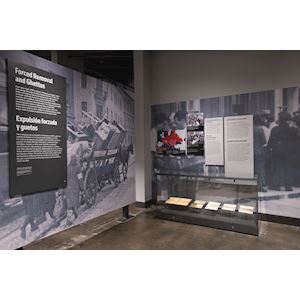
103 - Bearing Witness - Attempts to Escape
NARRATOR Of course, people tried to escape. When the Nazis first used repressive laws and pogroms to compel Jews to leave Germany in the 1930s, some did. Hundreds of thousands emigrated, often forced to leave their possessions behind, which were then redistributed to Nazi families. Persecuted people who chose not to leave their homes may have believed the troubles would pass in a short while. They simply did not know what was coming and didn’t have the benefit of our hindsight. Who could have predicted the genocide? Walter Kase: "...but we didn't think that this will be life-threatening, that the worst disaster ever perpetuated on human beings was in the making. So we looked at it as an inconvenience..." NARRATOR As their situation became more and more dire, a “way out” was not available to everyone. In addition to needing extraordinary amounts of money, potential emigrants had to obtain visas, gain transportation, and coordinate complicated paperwork—monumental obstacles… paper walls and real walls that had to be overcome. Ben Waserman: "My father lost his business and we had to move from our place to a little apartment and he tried very hard to get out of Germany. He contacted some of his friends to smuggle us into Switzerland. We tried to get into Spain...but we couldn't get out...we just didn't get the papers together..." NARRATOR After the first waves of Jewish emigration in the late ‘30s, doors began shutting. Much of the rest of the world was still recovering from economic depression. Suspicion rose in potential ports of refuge, including the U.S.: Will the refugees take our jobs? Do they bring in disease? Are they spies? Who is going to support them? Not everyone was an Albert Einstein, who offered unique gifts to the nation that welcomed him in 1933. In the decade that followed, he lobbied for the U.S. to increase immigration for victims of Nazi persecution. His own sense of the challenge is articulated in the letter he wrote in 1939: MALE VOICE “In these years of affliction, our readiness to help one another is being put to an especially severe test… rescuing our persecuted fellow-Jews from their calamitous peril and leading them toward a better future.”


Holocaust Museum Houston
Holocaust Museum Houston is dedicated to educating people about the Holocaust, remembering the 6 million Jews and other innocent victims and honoring the survivors’ legacy. Using the lessons of the Holocaust and other genocides, we teach the dangers of hatred, prejudice, and apathy.
- 5401 Caroline
- Houston United States
- 713-942-8000
- www.hmh.org
